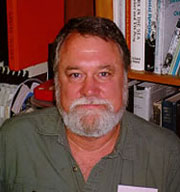NSU Newsroom
SharkBytes
Horizons
This version of NSU News has been archived as of February 28, 2019. To search through archived articles, visit nova.edu/search. To access the new version of NSU News, visit news.nova.edu.
This version of SharkBytes has been archived as of February 28, 2019. To search through archived articles, visit nova.edu/search. To access the new version of SharkBytes, visit sharkbytes.nova.edu.
Next Climate Series Talk: Melting Permafrost, Amplified Climate Change in High Latitudes—Oct. 4
Is climate change causing once-frozen soil to melt at rapid rates? The next Climate-Sustainability Lecture Series talk will provide an update on permafrost that’s changing in Alaska and the Arctic region. The talk is hosted by the Farquhar College of Arts and Sciences Division of Math, Science, and Technology.
“Changing Permafrost, from Fairbanks to Barrow and the Arctic Continental Shelves”
Climate-Sustainability Lecture Series | John Van Leer, Ph.D. (University of Miami)
Friday, Oct. 4
12:05–12:55 p.m.
Mailman-Hollywood Building | Second Floor Auditorium
Permafrost is permanently frozen soil containing vast quantities of organic materials and methane hydrates with a thickness of 1,200 to 2,100 feet. It covers nearly a quarter of the land area in the northern hemisphere, plus large areas of the continental shelves surrounding the Arctic Ocean.
However, warmer oceanic temperatures have initiated permafrost melting, particularly on the sea bed, where permafrost comes in direct contact with warm water. It’s estimated that the 50 gigatonne of melting methane hydrates—on the Siberian shelf alone—can have large-scale impacts on both the global climate and the world economy. This talk will discuss the changing permafrost and the postindustrial climate change amplified in high (Arctic) latitudes compared with mid and low latitudes.
About the Speaker
John Van Leer is an associate professor of meteorology and physical oceanography at the University of Miami’s Rosenstiel School of Marine and Atmospheric Science. He specializes in developing new instruments and methods for measuring upper-ocean dynamics and the structure of bottom-boundary layer, including organized turbulence. Van Leer has worked in the Fram Strait and Arctic Ocean on three expeditions, measuring upper-ocean frontal and eddy properties under the ice.
This talk is free and all are welcome to attend. For more information, contact Song Gao, Ph.D., associate professor at the Farquhar College of Arts and Sciences, at (954) 262-8388.
